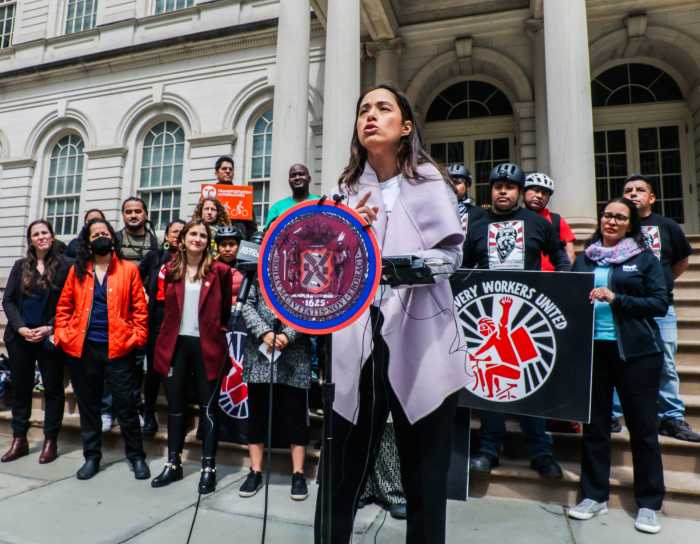
A Roman Catholic chapel in Battery Park City is in need of a miracle.
St. Joseph’s Chapel, which served as a haven for first responders during 9/11, faces closure as a result of a deal negotiated by the archdiocese about four years ago without participation by congregants, which increased its rent from $7,000 to $23,000 per month, according to distressed parishioners.
Congregants say they cannot afford the more than tripled rent payments and the church is surviving as a result of money borrowed from the archdiocese — the same entity that negotiated its crushing lease. St. Peter’s, which runs the mission chapel at South End Avenue and Liberty Street, has announced on its website that “the trustees and the members of the Finance Council believe that this significant operating loss is not sustainable.”
Should the indebted little chapel — which congregants believe is the only Catholic church in NYC to rent its space (disqualifying it from real estate tax breaks) — close, Battery Park City will lose its “official Catholic shrine to 9/11,” declared Justine Cuccia, a congregant and public member of Community Board 1.
Roman Catholics represent the single greatest religious group to have died on Sept. 11, 2001, according to the “Dedication of The Catholic Memorial at Ground Zero/St. Joseph’s Chapel.”
“This is sacred ground,” said Amy McCarthy, 52, a parishioner and mom who has worshiped there since she moved into Battery Park in 1999. “If they close down this chapel, there is nothing left in all of Battery Park that has a connection to 9/11 and that bothers me,” she said.
“This is the only house of worship on this side of the highway,” for any religion, said Laura Smiros, an architect who lives in Battery Park City and who attends Mass at St. Joseph’s, named for the patron saint of workers.
Jewish congregations lacking space in Battery Park also use the chapel to celebrate their High Holy Days.
After the towers fell, first responders and aid workers ripped out the pews in the damaged chapel to use the sanctuary to rest, sleep, shower and recover between working the toxic, steaming pile. Many individuals and organizations contributed to rebuild the little church, with some donating money in honor of loved ones who died in the towers.
The church has been additionally bedeviled by costly violations issued by the city for failing to be compliant with the Americans With Disabilities Act, as steps preface its bathrooms. Those fines are the fault of the landlord, Smiros said, who also said LeFrak/Gateway failed to obtain the appropriate certificate of occupancy that would exempt the church from ADA requirements as specified by the lease.
That irony is not lost on parishioner Tabitha Haly, 33, a financial analyst dependent upon a power wheelchair as a result of muscular dystrophy. Haly lives in TriBeCa, but travels all the way over to St. Joe’s on Sundays because “it’s the only wheelchair accessible church in downtown New York.” Haly’s dream is to marry in the church. “I don’t need the bathroom: I just need the entrance to be accessible,” which it is, she said: “I would be crushed,” should it close, she added. Smiros and Haly said bathroom access is an easily solved design problem.
Father Jarlath Quinn, pastor of St. Peter’s Church, which operates the chapel, declined to comment. The archdiocese and The Battery Park City Authority did not respond to emails.
A spokeswoman for LeFrak declined to address specific questions but sent amNY a statement: “Gateway is a joint venture between the LeFrak, Fisher and Olnick families. It is not a LeFrak family asset. Gateway has generously and unilaterally offered a significant reduction in rent to the church as a community gesture and awaits resolution from the Church.”
Congregants say the landlord has offered only about 10% off market rate rents for a commercial space, which is not a deep enough discount for the 100 to 200 families who regularly worship at St. Joe’s. “They’re talking to us, which is nice: They’re just not cheap enough,” Cuccia said.
“A chapel is more than a place to go to Mass: It’s a community that has been here since Battery Park has been here,” said McCarthy, who noted that the church is cherished by those who returned to their damaged homes to confront the “ghosts”of the Sept. 11 attacks.
The chapel is also a quiet, peaceful place of contemplation for those who have not forgotten the horrors visited upon Manhattan, McCarthy said. “Not everyone wants to go to the World Trade Center Memorial and then go to Eataly,” McCarthy said.
McCarthy is hoping Gateway will be swayed to perform a “Christian act of kindness” and lower rent on the peaceful refuge next to the Hudson River. If that is not to be she wants FDNY and NYPD personnel and other survivors of 9/11 to know that a sanctuary upon which they relied is about to close “so they can come and say goodbye.”
Cuccia is rooting for government intervention – if not a miracle of God. “The separation of church and state shouldn’t stop officials from realizing this chapel deserves to be saved,” she said. Should it close, said Cuccia, “It would be a death knell for the community.”





































